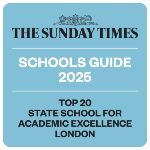English
There are eight members of the English department at Cardinal Vaughan Memorial School. Our aim is to achieve the highest grades possible for the students of the school. We strive to empower students by equipping them with the ability to communicate and express themselves effectively, in speech and writing, for the workplace and for life. It is also our intent to foster a love of literature in the pupils. In the Lower School, we focus on the basics of grammar and punctuation, and writing for different audiences and purposes, before encouraging them to craft effective and dynamic creative writing. We encourage analytical and interrogative reading of a variety of different texts, stretching our pupils by introducing them to some of the finest writing in the English canon. Throughout the key stages, the courses promote understanding of the influences of history and diverse cultures on the texts studied.
Curriculum Overview
Key Stage Three
The aim of the first years in English is to consolidate and extend boys' knowledge about language, to develop their skills in speaking, listening, reading and writing, and to introduce them to a variety of literary texts. Knowledge about language and how to spell and punctuate correctly is developed through analysis of what the boys write, formal grammar exercises and proofreading. Speaking and listening is practised in a variety of ways, such as debating, small-group discussions, drama and discussion in class. Reading involves the study of texts by the class as a whole - plays, poems, novels, short stories - and of guided individual choices. During the Lent term, all classes study a Shakespeare play. A large part of our work is the continual promotion of wider reading: pupils are encouraged to keep records of their private reading in logs. The first years also participate enthusiastically in our accelerated reader scheme. There are weekly, or fortnightly, library periods for each class, and every class begins with ten minutes silent reading.
Key Stage Four
We follow the AQA syllabus for the English Language and English Literature GCSEs. Each pupil will gain two GCSEs, plus a grade for the quality of their spoken English. Please see AQA | Subjects | English for further details.
There will be two papers for each of the English GCSEs. English Language covers the full range of skills needed in English, testing reading, both understanding and analysis, and writing, both practical and creative. The English Language GCSE requires that alongside language skills, pupils will need to broaden their knowledge and experience, advance their thinking skills and become mature and engaged readers. To this end, pupils will participate in metacognition lessons, will engage in wide ranging discussions and will hopefully become independent learners and critical thinkers.
To further this aim, pupils must read widely, and the English Literature syllabus seeks to ensure that pupils are exposed to literature from the English Canon through the ages. A broad range of literature will be studied. Below are the AQA texts choices:
| Shakespeare | Prose |
|
Macbeth Romeo and Juliet The Tempest The Merchant of Venice Much Ado About Nothing Julie Caeser |
William Golding Lord of the Flies AQA Anthology Telling Tales George Orwell Animal Farm Kazuo Ishiguro Never Let Me Go Meera Syal Anita and Me Stephen Kelman Pigeon English |
| 20th Century Drama | The 19th Century Novel |
|
JB Priestly An Inspector Calls Willy Russell Blood Brothers Alan Bennett The History Boys Dennis Kelly DNA Simon Stephens The Curious Incident of the Dog in the Night-time Shelagh Delaney A Taste of Honey |
Charles Dickens A Christmas Craol Charles Dickens Great Expectations Robert Louis Stevenson The Strange Case of Dr Jekyll and Mr Hyde Charlotte Brontë Jane Eyre Mary Shelley Frankenstein Jane Austen Pride and Prejudice Sir Arthur Conan Doyle The Sign of Four |
Poetry
Pupils will study one cluster of poems taken from the AQA poetry anthology, Power and Conflict.
Unseen poetry
In preparing for the unseen poetry section of the examination pupils should experience a wide range
of poetry in order to develop their ability to closely analyse unseen poems. They should be able to
analyse and compare key features such as their content, theme, structure and use of language.
| English Language | English Literature |
|
Paper One - Written Exam: 1 hr 45 mins - Unseen texts - 80 marks: 50% of GCSE
Section A: Reading
Section B: Writing
Questions Reading (40 marks) (25%) - two linked texts
Writing (40 marks) (25%)
|
Paper One - Written exam: 1 hr 45 mins - 64 marks - 40% of GCSE
Pupils will answer one question on their play of choice. They will be required to write in detail about an extract from the play and then to write about the play as a whole.
Section B: The 19th century novel Pupils will answer one question on their novel of choice. They will be required to write in detail about an extract from the novel and then to write about the novel as a whole. |
|
Paper Two - Written exam: 1 hr 45 mins - Unseen texts - 80 marks: 50% of GCSE
Section A: Reading
Section B: Writing
Questions
|
Paper Two
- Written exam: 2 hr 15 mins - 96 marks - 60% of GCSE
Section A: Modern texts Pupils will answer one essay question from a choice of two on their studied modern prose or drama text.
Section B: Poetry Pupils will answer one comparative question on one named poem printed on the paper and one other poem from their chosen anthology cluster.
Pupils will answer one question on one unseen poem and one question comparing this poem with another poem from the anthology. |
A-Level English
We follow the OCR syllabus for English Literature: AS and A Level - English Literature - H072, H472 - OCR
Our current text choices are underlined and in bold:
|
Exam 1: 40% of total A level. Section 1: Shakespeare Coriolanus Hamlet Measure for Measure Richard III The Tempest Twelfth Night. |
Section 2: Drama and Poetry Pre-1900 Drama Marlowe – Edward II Webster – The Duchess of Malfi Goldsmith – She Stoops to Conquer Wilde – An Ideal Husband Ibsen – A Doll’s House. Poetry Chaucer - The Merchant’s Prologue and Tale Milton – Paradise Lost Books 9 & 10 Coleridge – Selected Poems Tennyson – Maud Rossetti – Selected Poems. |
|
Exam 2: 40% of total A level. Comparative and Contextual Study, Topic Areas and Core Set Texts Gothic Literature, Beloved and Dracula Component 3: Coursework: 20% of total A level. |
|
Outside the classroom
The English Department runs various trips in order to enrich the curriculum. Our students visit the theatre as often as possible to see the works they study, or works of the same genre, performed. Where this is not possible, we try to invite actors to the school to perform here. Each Fifth Form group enjoys the tremendous experience of seeing the country’s premier poets perform the poetry studied at the ‘Poetry Live!’ conference, where the boys have the opportunity to ask the poets questions about their work. If possible, Sixth Form students, in preparation for their exams and also for university study, are taken to conferences on their set texts, and, if ever possible, to hear the authors speak. We run two debating clubs for the Lower School and one in the Upper School. There are also opportunities to write for the Lower School newspaper and to join the Lower School Drama club. Various writing competitions are also run throughout the Lower School.
In fourth form students take part in 'Speak Out' a competition sponsored by the Jack Petchey Foundation and run by the Speakers Trust to promote communication skills through expert led workshops and coaching. The English department works alongside the organisation to host a day of sessions where every student in fourth form is given the opportunity to ‘speak out’ to an audience about a topic they were passionate about, and notably one of our students was the 2024 national winner.





 Pay Online
Pay Online Arbor Parent Portal
Arbor Parent Portal
